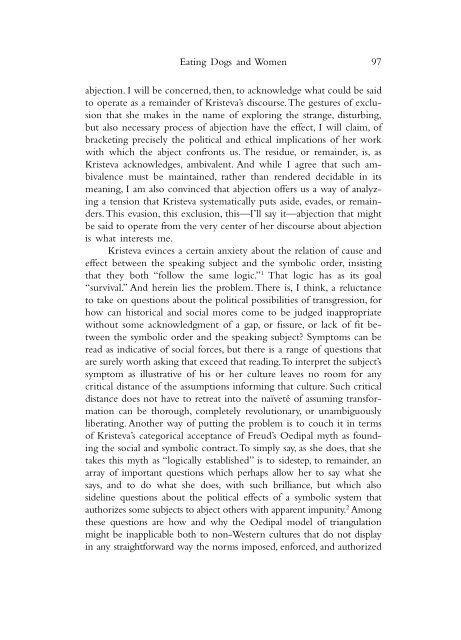Create successful ePaper yourself
Turn your PDF publications into a flip-book with our unique Google optimized e-Paper software.
Eating Dogs and Women<br />
abjection. I will be concerned, <strong>the</strong>n, to acknowledge what could be said<br />
to operate as a remainder <strong>of</strong> Kristeva’s discourse. The gestures <strong>of</strong> exclusion<br />
that she makes in <strong>the</strong> name <strong>of</strong> exploring <strong>the</strong> strange, disturbing,<br />
but also necessary process <strong>of</strong> abjection have <strong>the</strong> effect, I will claim, <strong>of</strong><br />
bracketing precisely <strong>the</strong> political and ethical implications <strong>of</strong> her work<br />
with which <strong>the</strong> abject confronts us. The residue, or remainder, is, as<br />
Kristeva acknowledges, ambivalent. And while I agree that such ambivalence<br />
must be maintained, ra<strong>the</strong>r than rendered decidable in its<br />
meaning, I am also convinced that abjection <strong>of</strong>fers us a way <strong>of</strong> analyzing<br />
a tension that Kristeva systematically puts aside, evades, or remainders.<br />
This evasion, this exclusion, this—I’ll say it—abjection that might<br />
be said to operate from <strong>the</strong> very center <strong>of</strong> her discourse about abjection<br />
is what interests me.<br />
Kristeva evinces a certain anxiety about <strong>the</strong> relation <strong>of</strong> cause and<br />
effect between <strong>the</strong> speaking subject and <strong>the</strong> symbolic order, insisting<br />
that <strong>the</strong>y both “follow <strong>the</strong> same logic.” 1 That logic has as its goal<br />
“survival.” And herein lies <strong>the</strong> problem. There is, I think, a reluctance<br />
to take on questions about <strong>the</strong> political possibilities <strong>of</strong> transgression, for<br />
how can historical and social mores come to be judged inappropriate<br />
without some acknowledgment <strong>of</strong> a gap, or fissure, or lack <strong>of</strong> fit between<br />
<strong>the</strong> symbolic order and <strong>the</strong> speaking subject? Symptoms can be<br />
read as indicative <strong>of</strong> social forces, but <strong>the</strong>re is a range <strong>of</strong> questions that<br />
are surely worth asking that exceed that reading. To interpret <strong>the</strong> subject’s<br />
symptom as illustrative <strong>of</strong> his or her culture leaves no room for any<br />
critical distance <strong>of</strong> <strong>the</strong> assumptions informing that culture. Such critical<br />
distance does not have to retreat into <strong>the</strong> naïveté <strong>of</strong> assuming transformation<br />
can be thorough, completely revolutionary, or unambiguously<br />
liberating. Ano<strong>the</strong>r way <strong>of</strong> putting <strong>the</strong> problem is to couch it in terms<br />
<strong>of</strong> Kristeva’s categorical acceptance <strong>of</strong> Freud’s Oedipal myth as founding<br />
<strong>the</strong> social and symbolic contract. To simply say, as she does, that she<br />
takes this myth as “logically established” is to sidestep, to remainder, an<br />
array <strong>of</strong> important questions which perhaps allow her to say what she<br />
says, and to do what she does, with such brilliance, but which also<br />
sideline questions about <strong>the</strong> political effects <strong>of</strong> a symbolic system that<br />
authorizes some subjects to abject o<strong>the</strong>rs with apparent impunity. 2 Among<br />
<strong>the</strong>se questions are how and why <strong>the</strong> Oedipal model <strong>of</strong> triangulation<br />
might be inapplicable both to non-Western cultures that do not display<br />
in any straightforward way <strong>the</strong> norms imposed, enforced, and authorized<br />
97
















